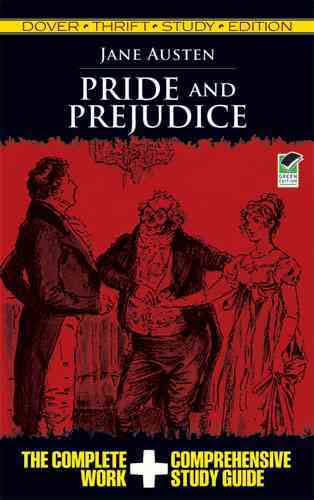Pride and Prejudice
Jane Austen

Description
First published in 1813, the story charts the emotional development of the protagonist, Elizabeth Bennet, who learns the error of making hasty judgments and comes to appreciate the difference between the superficial and the essential.
| Length | Emails required |
|---|---|
| 2,257 lines | 57 (based on one per day) |
Preview - part1 of57
The Project Gutenberg EBook of Pride and Prejudice, by Jane Austen This eBook is for the use of anyone anywhere at no cost and with almost no restrictions whatsoever. You may copy it, give it away or re-use it under the terms of the Project Gutenberg License included with this eBook or online at www.gutenberg.org Title: Pride and Prejudice Author: Jane Austen Posting Date: August 26, 2008 [EBook #1342] Release Date: June, 1998 Last Updated: October 17, 2016 Language: English Character set encoding: UTF-8 *** START OF THIS PROJECT GUTENBERG EBOOK PRIDE AND PREJUDICE *** Produced by Anonymous Volunteers PRIDE AND PREJUDICE By Jane Austen Chapter 1 It is a truth universally acknowledged, that a single man in possession of a good fortune, must be in want of a wife. However little known the feelings or views of such a man may be on his first entering a neighbourhood, this truth is so well fixed in the minds of the surrounding families, that he is considered the rightful property of some one or other of their daughters. “My dear Mr. Bennet,” said his lady to him one day, “have you heard that Netherfield Park is let at last?” Mr. Bennet replied that he had not. “But it is,” returned she; “for Mrs. Long has just been here, and she told me all about it.” Mr. Bennet made no answer. “Do you not want to know who has taken it?” cried his wife impatiently. “_You_ want to tell me, and I have no objection to hearing it.” This was invitation enough. “Why, my dear, you must know, Mrs. Long says that Netherfield is taken by a young man of large fortune from the north of England; that he came down on Monday in a chaise and four to see the place, and was so much delighted with it, that he agreed with Mr. Morris immediately; that he is to take possession before Michaelmas, and some of his servants are to be in the house by the end of next week.” “What is his name?” “Bingley.” “Is he married or single?” “Oh! Single, my dear, to be sure! A single man of large fortune; four or five thousand a year. What a fine thing for our girls!” “How so? How can it affect them?” “My dear Mr. Bennet,” replied his wife, “how can you be so tiresome! You must know that I am thinking of his marrying one of them.” “Is that his design in settling here?” “Design! Nonsense, how can you talk so! But it is very likely that he _may_ fall in love with one of them, and therefore you must visit him as soon as he comes.” “I see no occasion for that. You and the girls may go, or you may send them by themselves, which perhaps will be still better, for as you are as handsome as any of them, Mr. Bingley may like you the best of the party.” “My dear, you flatter me. I certainly _have_ had my share of beauty, but I do not pretend to be anything extraordinary now. When a woman has five grown-up daughters, she ought to give over thinking of her own beauty.” “In such cases, a woman has not often much beauty to think of.” “But, my dear, you must indeed go and see Mr. Bingley when he comes into the neighbourhood.” “It is more than I engage for, I assure you.” “But consider your daughters. Only think what an establishment it would be for one of them. Sir William and Lady Lucas are determined to go, merely on that account, for in general, you know, they visit no newcomers. Indeed you must go, for it will be impossible for _us_ to visit him if you do not.”